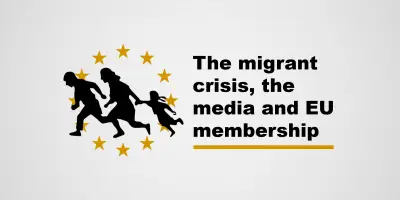Since the start of summer, the media has been saturated with coverage of the ongoing migrant crisis; starting with the blockade at Calais in June, we have been taken across the Mediterranean, along Hungarian highways, and through deserted temporary camps, witnessing tragedy, desperation, hope, and welcoming, as migrants have made their way across European borders in search of asylum, economic opportunity, or both.
Austria, Slovenia, the Netherlands, and Hungary have so far followed Germany in introducing border checks to control the inflow of migrants, and tense negotiations around a resettlement programme for over 120,000 asylum seekers have yet to reach a solution. As talks over compulsory redistribution cause disharmony amongst member states, British politicians from both the ‘stay’ and ‘leave’ camps will undoubtedly be considering the implications of the migrant crisis for the EU referendum on the horizon. For the supporters of continued membership, the current crisis threatens to make migration appear an acute problem which Britain is being drawn into as the result of EU membership; for those in favour of a ‘Brexit’, the current crisis is an opportunity to shine a light on the contentious open border policy as part of the Schengen Agreement, one of the fundamental cornerstones of the EU.
The debate around a potential Brexit will no doubt address a broad range of issues, such as the UK’s net financial contribution to the EU, freedom of trade, and the influence of European courts on British law, however it is migration which is likely to dominate discussions. It is well documented that the British public consistently rank immigration as an important issue, and the current focus of the media on the crisis across Europe will be likely to inflate the public’s perception of the domestic implications. If polls are to be believed, public anxiety about migration is at an all-time high: in the most recent Economist/Ipsos Mori issues index from August, 50 percent of those surveyed rated immigration as the most important issue facing Britain today – the highest level of concern which has been registered by the index, and an eight percentage point increase on the July poll.
Concerns about EU membership are also closely linked to views on migration, with the Migration Observatory at Oxford University having recently highlighted how opposition to migration amongst British citizens is strongly tied to Euro-scepticism. Few will probably be aware that Britain has taken in less than 1 percent of Syria’s refugees (187) and the number of asylum seekers in the UK has actually fallen by 76,493 since 2011, and yet a recent YouGov poll showing that 48 percent of the public were opposed to their own local council housing as little as ten refugee families. For staunch Euro-sceptics, any concessions to Europe on migrants will be seen as a failure, effectively demonstrating that there is little room for negotiation around border control and freedom of movement.
In light of any concessions made to the EU on migrant resettlement, it will prove challenging for the ‘stay’ camp to convey to the public a vision for membership which includes a renegotiation of freedom of movement, and David Cameron – who supports continued membership of the EU – will have to do much to allay the fears of voters who believe that the EU is dictating the direction of Britain from Brussels. Fresh in the minds of voters will be images of chaos across Europe, as member states struggle to deal with demand and come to an agreement about what is to be done.
The ‘stay’ camp will need to convince voters that the EU is an institution which can evolve and develop in line with the demands of its membership. The ‘leave’ camp simply needs to use the migrant crisis as a case study which evidences the claim that the EU is a behemoth which takes away from Britain domestic control over migration and border control.
As the crisis continues, there is a growing appetite amongst EU member states for tighter external controls and a stricter definition of what constitutes an asylum seeker, in order to stem the influx of migrants. A renegotiation of these terms by member states may offer favourable ground on which the ‘stay’ camp can build their campaign. Leaders in Europe must be pushed to think seriously about the sustainability of the Schengen Agreement, and this will undoubtedly influence on how both the ‘stay’ and ‘leave’ camps approach the looming referendum.




